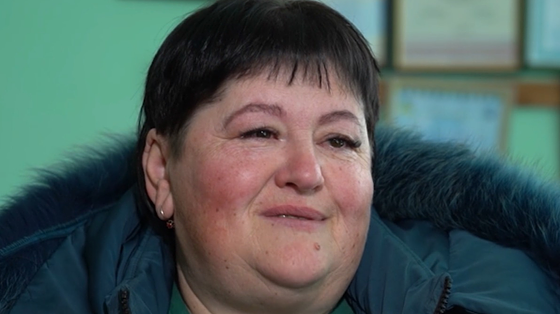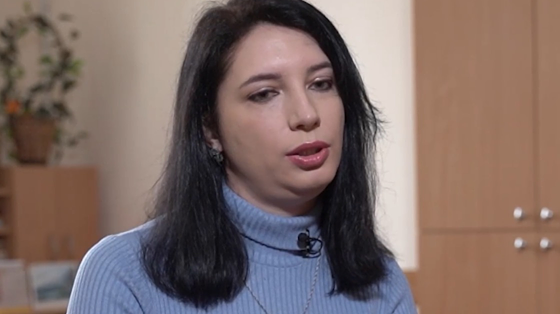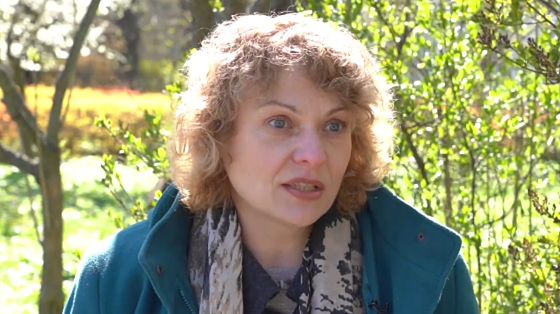Yevheniya Zabogonska worked at the Drama Theatre in Mariupol for many years. She, her husband and their daughter were among the first who happened to be in the bomb shelter here when the Russian army began to destroy Mariupol. Then she became a superintendent of the bomb shelter.
On the worst days, 1,200 people found shelter in the building at one time.
Yevheniya is one of the survivors of the airstrike. She told us how Mariupol residents tried to find rescue in the bomb shelter, and how “CHILDREN” sign appeared in front of the theatre’s entrance.
My name is Yevheniya Zabogonska. I am a lighting designer at Donetsk Regional Academic Drama Theatre in Mariupol. I am a Mariupol resident. I have lived in the city of Mariupol all my life.
On 24 February, my family woke up early in the morning from loud sounds and explosions. Our flat was located in the downtown, so the window glass rattled in flats even in the city centre. By the evening, the bombing did not stop and my family and I decided to go to the bomb shelter of the Drama Theatre.
At first, people came to the drama theatre just to wait out the bombing. When everything calmed down, they went back home. Later, when the bombing intensified, people came with their families and stayed in the theatre. The bomb shelter in the theatre was small, designed for 50-60 people according to all standards.
The floors in the bomb shelter were made of concrete. Initially, in order to accommodate people, we put wood decks on the floors and on top of them, we placed the scenes (stage curtains) or some kind of rugs in order to make some space for people. We covered the walls with foamed plastic boards so that it would not be cold, since it was the end of February – the beginning of March. It was very cold and the weather did not treat us with warm temperatures. When there were up to 100 people in the theatre, we coped. Some theatre workers brought hot food for children, women and the elderly.
When the power supply was cut off in the theatre, and when the whole city was disconnected from electricity, water and heating, it became more difficult. We started collecting rainwater and melting snow in order to keep the bathrooms clean. This water was not enough, but we managed so far.
In order to warm up, we ran home and boiled water there. We brought some hot water to the theatre and people could drink hot tea, cook some instant noodles, some porridges, or just drink something hot and warm up.
One nice day, the city authorities announced the evacuation from the theatre, from Theatre Square. A large number of people came there hoping to leave Mariupol, but the evacuation was cancelled. A lot of people, about 500 people, according to our estimates, remained in the drama theatre.
This crowd was frightened, angry and uncontrollable, but we could understand those people. Everyone was scared. People began to demand some space for us to accommodate them. We could not provide places for such a number of people immediately, we needed some time.

We began to take out all the chairs, sofas, armchairs that were used in the scenery at the performances, but people did not want to wait. They began to tear off the chairs in the theatre house. We asked them not to do this; we brought some tools and began to unscrew the chairs so that everything would remain in good shape. People did not listen. The theatre auditorium was destroyed in a few days.
People found accommodation everywhere. They did not listen even when we told them that the most dangerous places in the theatre are the auditorium and the stage. “Do not go there, do not settle there” – they did not listen to us.
We could not order them, we could only prompt and tell them, which we did. There were a lot of people, all sorts of people. There were men, women, children, and mothers with small kids; the smallest child in our theatre was only three weeks old. It was a little boy called Mark. He left the theatre with his parents on 15 March, the day before the explosion. In general, there were a lot of children.
Various children, including small kids, babies up to a year old. There was not enough food for them, not enough some basic wet wipes, which I initially distributed in disposable bags, several pieces to each mum. There was a terrible shortage of wet wipes. Later, when a box of them was brought to me, each mother received those priceless wet wipes. We coped. We coped thanks to the fact that many people came and offered their help.
This is how our services were organized: our security service; a crew that boarded up the windows; a service that prepared the firewood, that prepared the water, that maintained the fireplaces, that took care about our food supplies; a cooking service; a service of cleaning ladies “Fairies of Purity”, who helped me with washing the bathrooms and with keeping our premises clean.
We even had some people who burned garbage so as not to litter the theatre and surrounding area, as there were a lot of people and a lot of garbage accordingly. We had to deal with it somehow; we coped with it as we could.
One day we boarded up the windows on one side of the theatre and the next day we wanted to board up the windows on the other side. When we began to prepare the materials to board up the other side of the theatre, a mortar shell hit the building. This shell was held back by a fir-tree growing near the theatre.
The fir-tree was left without branches, and we were left without window glass on one side of the theatre. However, what saved us was the fact that we boarded up these windows the day before. It helped us a lot. Not a single person inside the theatre was injured. Some people were injured on the street, some guys who worked in the field kitchen were injured, and two women who cooked their lunch were injured too. The guys who worked in the field kitchen were examined by medics, their injuries were treated and some 15-20 minutes later they continued cooking lunch for people. The women who cooked their own lunch suffered more. They needed some professional help from surgeons. One woman had a leg wound and severe bleeding; another woman had cut buttocks, and she also had heavy bleeding.
Our security guards quickly found people who were ready to help and take these women to the hospital in the 17th micro-district. At that time, one unpleasant story happened, a terrible one. It struck the whole theatre, everyone, all the people who lived in the theatre. A young girl, named Nastya, who was 15 years old, volunteered to accompany the woman who had her buttocks cut by shell fragments. Nastya was an athlete, a very bright and kind person.
Everyone in the theatre loved her: children, women, and old people. She was… she is a very good person. She is alive. I know it, that after the explosion in the theatre she is alive. So, Nastya volunteered to accompany the woman, because she understood that someone had to be with her in order to take her to the hospital and check her in.
When they were taking this woman to the hospital, their car came under automatic/machine-gun fire. Nastya was badly wounded. The bullet entered her thigh and exited through her abdomen. Nastya was left in the hospital and we were told that they would bring her back to us in a few days. Everyone in the theatre was in shock. Everyone was very afraid for Nastya. Children cried when they found out what happened to her.
All the time, everyone asked me how Nastya was, where Nastya was, what was with her. We were waiting for some news from the hospital. We knew that Nastya had been operated on, and that she was all right, that in a few days she would be with us. And so it happened.
Nastya was brought to us with drains, as she was after an operation. Our medics examined her and handed me a huge list of medicines saying, “Zhenya, this is very much needed.” My husband Serhiy Zabogonskyi was our public relations representative. He kept in touch with various volunteer organizations, and with the police too. He went to these organizations and reported what our bomb shelter needed.
That was what happened this time as well. Serhiy went to Caritas, gave the guys a list of medicines, explained the situation, and the guys showed understanding. The next day, the entire package of medicines for Nastya was at the theatre. Nastya got injections of antibiotics and some droppers, and a few days later, she was on her feet again, walking around the theatre.
When Nastya was brought back from the hospital, everyone who was in the theatre wanted to visit her, see her and tell her how worried he or she was about her, and how they were waiting for her return.
No matter how difficult it was, we got a lot of help. The police helped us a lot. The police supplied our bomb shelter with medicines and food. In the last days, they even managed to get us mattresses, blankets, pillows, and even bed linen for people who lived in the theatre.
Volunteer organizations also brought us medicines; not much, but we were still thankful to them. Each pill of Citramonum, Aspirin, and Paracetamol was very much needed. Volunteer organizations helped us with baby diapers, basic toilet paper, and detergents, anything they could share. We are extremely thankful to them.
The police helped us solve the problem with the kitchen. They brought us a field kitchen. For those who does not know what a field kitchen is, this is a large trailer where you can make a fire and cook food, cook soup, porridge, and anything else you have ingredients for, in four 40-liter pots/tanks. We did just that. We boiled water on large outdoor fires and cooked food in the field kitchen.
Naturally, we had problems with water supplies. Well, given such a number of people! We needed to maintain some sanitary standards, give people some hot water, and feed them.
While there were fewer people, we coped. When the number of people grew up significantly, we decided to use the water that was in the theatre’s fire tanks. They were located right next to the theatre.
These were the water tanks containing 200 tons of water. We used one tank for ourselves, and the second tank was used by fire brigades who came to take water for fire extinguishing. At first, five fire brigades came to us, but every next day, there were fewer and fewer of them.
And one day they stopped coming to us at all. We understood why this happened. Because there was no longer a fire station on Zelinskoho Street. However, life went on. People from nearby houses and other districts of the city began to come to us for water. People came to us just to get some food. It seems that we had enough food.
Once a day, people necessarily got some hot meals, had some nutritious soup, some kind of first course, but always cooked on broth, so that people could get some calories, some hot meals. In the evening, hot water, tea, and some candies were always given out. Sometimes sausages were delivered to us. If we baked some bread, then children received that bread.
We helped people as best as we could. We did everything from the heart, and we always tried to make the situation better for people. Some people appreciated it and thanked us, and others asked why they were getting so little. Well, it is difficult to please everyone. It is obvious that with this number of people we had so many opinions.
My every morning in the theatre started at 6 o’clock. I made my duty tour around the theatre, watched how people were after the night, what happened during the night, and how much the city around the theatre changed during the night. Then at 8 o’clock in the morning, we had a planning meeting/briefing. Each service line had its own team leader. We addressed some problems that arose in the theatre together with the team leaders. We found solutions to these problems and then dispersed to our workplaces.
One such morning, one of my assistants came up to me and said, “I have an idea. To further protect us here, let’s write that there are children here. I said, “Great idea. Let’s do it.” We went up to the fourth floor. There, under the roof, there was a workshop of our theatre’s artists, our security guards, and our watchmen.
Our theatre staff members opened this workshop for us. We found some white paint, a paint roller – and the next day, “CHILDREN” signs appeared on both sides of the theatre.
We really hoped that these signs would be of help. We could not even think that something could fly into the theatre [hit the theatre]. We were sure that no one would touch the theatre and our bomb shelter. Everyone saw, everyone knew what a huge number of people were in the theatre, how many children and women. They saw the kitchen, saw people coming and leaving, and saw that there was life around the theatre. Sometimes my assistants even joked. They said, when all this is over, there will be a hostel “Drama Theatre”. We will be living here and rebuilding the city. We joked and at the same time believed that it would be really so. Well, it has not come true. It was very difficult, but I am grateful to heaven that it sent me so many good and kind people who helped me.
I was the superintendent in the hostel, the bomb shelter of the drama theatre. I was appointed by the city police. At the very beginning, when I ran home to get some hot water, one day the police came and began to talk to the people who lived in our bomb shelter. They asked people how they lived, what they needed, and decided to appoint a senior representative among us. People unanimously pointed at me. So I became the superintendent of the drama theatre’s bomb shelter. I tried my very best.
I worried very much and really hoped that everything would be fine. On 16 March, the theatre was gone. On the night of 15-16 March, the city centre was heavily bombed. It was the scariest night I have ever experienced in my life.
I did not sleep all night, and everything around was shaking. It seemed that the bombs were coming in every second. This shaking of the earth did not stop. In the morning, it seemed to become quiet, and a huge number of people left the theatre. Some people left before that too. A few days before that, people began to self-organize some convoys, without any escort, without any protection, and leave Mariupol.
The same was on 16 March. In the morning, at 7 o’clock in the morning, the first convoy went off. A lot of people left, a large number of people left on 16 March. The population of the theatre thinned out, and we went about our usual business – tidying up, putting things in order and preparing places for new people who would come in later. To have a calm talk, my husband and I went into the electrical shop. There were two load-bearing walls and two fire doors. The room was small, but quite secure.
And just two minutes after we entered it, we felt ringing in the ears, darkness, and sparks – and we were covered by rubble. When it stopped collapsing and falling upon us, my husband and I shouted to each other. We realized that we were both alive.
My husband dug himself out first, and then he dug me out. It was impossible to get on the stage. There was a web of twisted metal structures, hanging cables, pipes from fly-bars and a curtain of smoke and dust. We went out into the hallway of the administrative part near the dressing rooms. There were a lot of frightened people there. We went down to the basement; there were many people there too.
They were scared; they were looking for each other. We went through the basement to the foyer on the ground floor. There people were screaming, looking for each other, children were looking for their parents, and parents for looking for their kids, men were looking for women. We went to the bomb shelter. The bomb shelter was intact. Our daughter was there, everything was fine, the child was scared, but she was safe. My husband said, “Take the child away, I’ll stay here.”
Before the big fire started, my husband helped to dig people out of the rubble. They managed to save some people, but they could not save everyone.
Now we are not in Mariupol. On 17 March we left, but we really want to go back home. We really hope to return there. I really want all this to end, so that people who are looking for each other would definitely find each other. So that all their hopes that their relatives are alive could come true. We want peace, kindness, stability and a bright future for our children. We want to go home.







.png)



